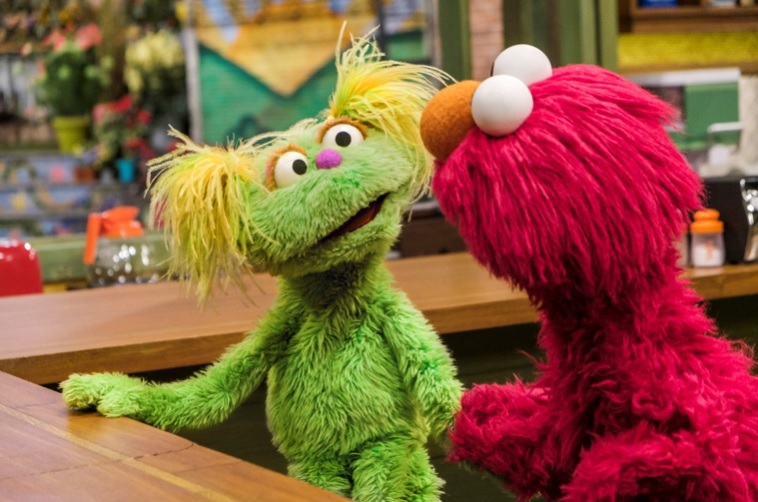Sesame Workshop Turns to Social Workers to Help Kids Impacted by Opioid Crisis

Karli (left) and Elmo. Photo courtesy of Sesame Street.
For small children impacted by addiction, it’s not always a sunny day.
With so many kids being affected by the opioid epidemic, immigration, gun violence and other societal ills Sesame Workshop – the nonprofit behind the long-time TV show Sesame Street – is not playing around when it comes to addressing these issues in real life.
They are turning to social workers and others to help inform the content children watch on the program daily.
Sesame Street first aired on public television 50 years ago and it has never avoided hard or controversial topics. For example, in 1983 when the actor who played Mr. Hooper passed away the show’s producers dealt with it honestly and explained his death in ways children would understand.
Its latest initiative features Karli, a 6 ½-year-old Sesame Street Muppet whose mom is dealing with addiction. In new videos and other content, favorite Sesame Street characters like Elmo and Abby Cadabby learn what Karli is going through and help their friend to cope, according to a release from Sesame Workshop.
“The resources, which are part of the Sesame Street in Communities program and freely available on www.SesameStreetinCommunities.org, deliver the words children need to hear most: You are not alone. You will be taken care of. Addiction is a sickness and, as with any sickness, people need help to get better. And most importantly: It’s not your fault.”
With its human cast and puppets (Elmo, Cookie Monster, the Count, Oscar the Grouch and others), Sesame Street has used make believe and pretend to encourage, educate and enthrall generations of children of all ages in 150 countries. Sesame Workshop reaches 150 million children worldwide and the organization says its impact is lasting and deep.
And intercession is increasingly important.
Social workers are now helping the organization help kids deal with the opioid crisis and other issues.,In the United States, there are 5.7 million children under age 11 – or one in eight children – living in households with a parent who has a substance use disorder. This number does not include the countless children not living with a parent due to separation or divorce, incarceration, or death as a result of their addiction, the workshop states.
In fact, one in three of these children will enter foster care due to parental addiction, a number that has grown by more than 50 percent in the last 10 years.
“Addiction is often seen as a ‘grown-up’ issue, but it impacts children in ways that aren’t always visible. Having a parent battling addiction can be one of the most isolating and stressful situations young children and their families face,” said Sherrie Westin, President of Social Impact and Philanthropy, Sesame Workshop. “Sesame Street has always been a source of comfort to children during the toughest of times, and our new resources are designed to break down the stigma of parental addiction and help families build hope for the future.”
Since launching in 2015, Sesame Street in Communities has supported families on topics ranging from traumatic experiences to family homelessness—giving children the tools they need to build resilience and grow smarter, stronger, and kinder.
Last year the organization focused on homelessness. This year, it’s parental substance-use disorder and foster care. Gun violence is next. The materials, which include videos, storybooks, digital interactives, games, and professional development resources, are available for free—in English and Spanish—at www.sesamestreetincommunities.org.
The organization’s producers and writers work with child developmental specialists, social workers, educators, and others and then use their feedback to mold story books, video scripts and downloadable guides for service providers as well as parents.
Jerry Moe, National Director of Children’s Programs at the Hazelden Betty Ford Foundation, and key advisor on the new initiative says children are often the first people to get hurt and the last to get the help they need.
“There have been precious few resources to help young children, so this initiative is a game-changer for the important work we do with kids at Hazelden Betty Ford and for professionals everywhere on the front lines of our nation’s addiction crisis,” that includes social workers.
For children who connect to Karli, hearing, ‘It’s not your fault—you are not alone, and there are safe people and places that can help,’ opens a path to hope and healing,” he says.
“This Sesame Street in Communities resource fills a huge void for millions of families hurt by addiction and helps kids be kids again.”
| Leave A CommentAdvertisement
1 Comment
Leave a Comment
You must be logged in to post a comment.



I love this! Unfortunately I need to work with an older demographic. Is there anything for middle school?